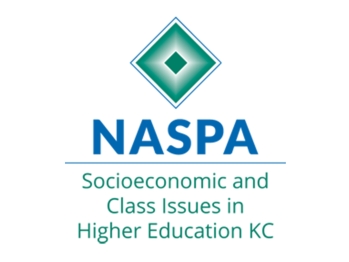
Socioeconomic and Class Issues in Higher Education
Socioeconomic and Class Issues in Higher Education
The Socioeconomic and Class Issues in Higher Education Knowledge Community (SCIHE KC) strives to be dynamic and supportive around issues of class and socioeconomic status as they affect Higher Education. The SCIHE KC envisions an environment where student affairs educators have access to information, training, and resources that help them to understand how these issues alter the college and university landscape.
Leadership Team
Awards
Complete Your Profile
Login and update your profile.
Resources
This page provides academic resources that can help you learn more about some of the important socioeconomic and class issues that impact higher education policy, faculty, staff, and students. Inclusion on this list does not represent endorsement of the information, site, or organization by NASPA and any of its entities. This list is not comprehensive.
We hope you find these resources valuable. Please email Victoria Svoboda, Research Coordinator, at [email protected] if you would like to suggest additions to this list.
JOURNAL ARTICLES
Adams, R., Brewer, R., Leondar-Wright, B., Lui, M., & Robles, B. with United for a Fair Economy. (2005). The color of wealth: How government actions widen the racial wealth divide. The New Press.
· Davis, J. (2010). The first generation student experience: Implications for campus practice, and strategies for improving. Stylus.
· Espenshade, T. J., & Walton Radford, A. (2009). No longer separate, not yet equal: Race and class in elite college admission and campus life. Princeton University Press.
· Heinz Housel, T., & Harvey, V. L. (2010). The invisibility factor: Administrators and faculty reach out to first-generation college students. Brown Walker Press.
· hooks, b. (2000). Where we stand: Class matters. Routledge.
· Hurst, A. (2010). The burden of academic success: Managing working-class identities in college (loyalists, renegades and double agents). Lexington Books.
· Jehangir, R. R. (2010). Higher education and first-generation students: Cultivating community, voice and place for the new majority. Palgrave Macmillan Press.
· Jensen, B. (2012). Reading classes: On culture and classism in America. Cornell University Press.
· Korgen, K. O. (2010). Multiracial Americans and social class: The influence of social class on racial identity. Routledge.
· Lareau, A. (2011). Unequal childhoods: Class, race, and family life, 2nd edition with an update a decade later. University of California Press.
· Sacks, P. (2007). Tearing down the gates: Confronting the class divide in American education. University of California Press.
· The New York Times. (2005). Class matters / correspondents of the New York Times. Times Books.
· Van Galen, J. A., & Dempsey, V. O. (2009). Trajectories: The social and educational mobility of education scholars from poor and working class backgrounds. Sense Publishers.
· Ward, L., Siegel, M. J., & Davenport, Z. (2012). First-generation college students: Understanding and improving the experience from recruitment to commencement. Jossey-Bass.
· Weis, L. & Dolby, N. (2012). Social class and education: Global perspectives. Routledge.
BLOGS
Interested in learning more about social class issues? We encourage you to explore the following:
· Education & Class, a blog by Dr. Jane Van Galen who frequently highlights class-related media, including the Harvard article above. She is also behind the digital storytelling project, First in Our Families.
· Classism Exposed, a blog by Class Action, a non-profit organization doing amazing work, including hosting first-generation summits and exceptional classism workshops for student affairs professionals. We highly recommend their work, which (unlike some other class-based organizations) pays great attention to race, gender, and other intersections with class.
Community on Homelessness and Foster Care
What is the Purpose of the Foster Care and Homelessness Sub-Knowledge Community?
The purpose of the Community is to center the experiences of students who have experienced foster care and/or homelessness. This community brings together students, staff, faculty, and other stakeholders toward creating awareness, systems of support, and identifying resources and best practices for students who have experienced foster care and/or homelessness.
Who is this Sub-Knowledge Community for?
This Community is for anyone who works with foster or homeless youth in higher education or supports foster or homeless youth in the college-going process and would like to learn more about how to students who have experienced foster care or homelessness. We invite you to join us! Look for a community meeting at the NASPA Annual Conference or reach out to the co-chairs to get involved.
What do we do?
-
Bi-Annual Webinars
-
Events at the NASPA Annual Conference (e.g., Networking and Community Building Breakfast, Interest Meetings, and Sponsored Conference Sessions/Presentation)
-
Community Newsletter that will highlight resources, best practices, and emerging research
Co-Chairs
-
Blayne Stone, Doctoral Student, Email: [email protected]
-
Justine Cheung, Arizona State University, Email: [email protected]
-
Kenyon Lee Whitman, University of Nevada, Las Vegas, email: [email protected]
Research Articles and Reports:
-
Amechi, M. H., Stone, B. D., & Williams, J. L. (2020). Transitions and pathways: HBCU college choice among Black students with foster care experience. Journal of The First-Year Experience & Students in Transition, 32(2), 9-24.
-
Bustillos, S., Norton, C. L., & Tampllin, E. (2023). Foster care liaisons in higher education: A conceptual framework for supporting post-secondary success among college students with experience in foster care. Child and Adolescent Social Work Journal, 40, 177-191. https://doi.org/10.1007/s10560-022-00903-y
-
Cheung, J. R., Lietz, C. A., Carpenter, B. M., Sitz, E., & Lietz, B. C. (2019). Cultivating Resilience in College Students with Foster Care Backgrounds. Journal of Public Child Welfare. https://doi.org/10.1080/15548732.2019.1679694
-
Cheung, J. R., & Villagrana, K. M. (2023). A narrative review of policies impacting elementary through postsecondary educational outcomes for children, youth and young adults with foster care histories. In R. W. Denby & C. Ingram (Eds.), Child and Family Serving Systems: A Compendium of Policy and Practice. Child Welfare League of America.
-
Geiger, J. M., Cheung, J. R., Hanrahan, J. E., Lietz, C. A., & Carpenter, B. (2017). Increasing competency, self-confidence, and connectedness among foster alumni entering a 4-year university: Findings from an early-start program. Journal of Social Service Research, 43(5), 566-579. https://doi.org/10.1080/01488376.2017.1342307
-
Geiger, J. M., & Johnson, R. M. (2023). Expanding our Understanding of Student Experiences and the Supports and Programs for College Students with Foster Care Experience: An Introduction to the Special Issue on Foster Care and Higher Education. Child and Adolescent Social Work Journal, 40(2), 159-161. https://doi.org/10.1007/s10560-023-00914-3
-
Geiger, J. M., Piel, M. H., Day, A., & Schelbe, L. (2018). A descriptive analysis of programs servicing foster care alumni in igher education: Challenges and opportunities. Children and Youth Services Review, 85, 287-294.
https://doi.org/10.1016/j.childyouth.2018.01.001 -
Johnson, R. M. (2021). The state of research on undergraduate youth formerly in foster care: A systematic review of the literature. Journal of Diversity in Higher Education, 14(1), 147–160.https://doi.org/10.1037/dhe0000150
-
Mody, E. H., Wang, C., Hoyte, J., & Ferguson, K. M. (2020). Data-driven service delivery: using population and coalition data to reengage opportunity youth in career and educational pathways. Journal of Technology in Human Services, 38,3840409. https://doi.org/10.1080/15228835.2020.1820424
-
Quintana, E., & Cook-Davis, A. (2022). Bridging Success: An evaluation of a program for foster care alumni. Morrison Institute for Public Policy. https://morrisoninstitute.asu.edu/sites/default/files/bridging_success_may_5_2022.pdf
-
Salazar, A. M., Haggerty, K. P., Roe, S. S. (2016). Fostering higher education: A postsecondary access and retention intervention for youth with foster care experience. Children and Youth Services Review, 11(70), 46-56.
https://doi.org/10.1016/j.childyouth.2016.09.008 -
Villagrana, K. M., Mody, E. H., Lawler, S. M., Wu, Qi, & Ferguson, K. M. (2020). Educational outcomes for homeless youth adults with and without a history in foster care. Children and Youth Services Review, 9(116),105153.
DOI: 10.1016/j.childyouth.2020.105153 -
Whitman, K. L., Espino, M. L., & Thompson, D. (2023). Foster(ing) Youth in the California State University: Understanding the Vital Role of Campus Support Programs. Center for the Transformation of Schools, School of Education & Information Studies, UCLA. https://transformschools.ucla.edu/research/fostering-youth-in-the-california-state-university-understanding-the-vital-role-of-campus-support-programs
Books, Manuals, Guides, and Resources:
-
Dettlaff, A. J. (2023). Confronting the racist legacy of the American child welfare system: The case for abolition. Oxford University Press. https://global.oup.com/academic/product/confronting-the-racist-legacy-of-the-american-child-welfare-system-9780197675267?cc=us&lang=en&#:~:text=Dettlaff%20traces%20the%20origins%20of,the%20system%20and%20the%20foreseeable
-
Emmerson, J., & Bassett, L. (2010) Supporting success: Improving higher education outcomes for students from foster care. Casey Family Programs. https://www.casey.org/media/SupportingSuccess.pdf
-
Geiger, J. M., & Schelbe, L. (2021). The handbook on child welfare practice. Cham, Switzerland: Springer. https://www.barnesandnoble.com/w/the-handbook-on-child-welfare-practice-jennifer-m-geiger/1139012038
-
Gross, J. P. (2019). Former foster youth in postsecondary education: Reaching higher. Palgrave Macmillan. https://doi.org/10.1007/978-3-319-99459-8
-
Johnson, R. (2024). From Foster Care to College Navigating Educational Challenges and Creating Possibilities. Teachers College Press. https://www.tcpress.com/from-foster-care-to-college-9780807786062
-
Okpych, N. J. (2021). Climbing a broken ladder: Contributors of college success for youth in foster care. Rutgers University Press. https://www.rutgersuniversitypress.org/climbing-a-broken-ladder/9781978809161/#:~:text=%22Climbing%20a%20Broken%20Ladder%20provides,higher%20education%20authorities%20should%20heed.
-
Schelbe, L. (2023). Some type of way: Aging out of foster care. Oxford University Press. https://global.oup.com/academic/product/some-type-of-way-9780197568712?cc=us&lang=en&#:~:text=Author%20Lisa%20Schelbe-,Description,providers%20doing%20to%20help%20them%3F
Additional Resources:
-
Foster & Homeless Youth Address How Their Experiences Impacted Their Pursuit of Higher Education
-
Foster Care to College: A Crisis WE Can Solve | Robert R. Duke | TEDxAzusaPacificUniversity
If you know of a critical piece of literature or helpful resource on this topic that has not been included please contact one of the co-chairs. We would love your input!
Professionals from Poor and Working Class
Are you a graduate student, student affairs professional, or faculty member from a working class, blue collar, and/or lower socioeconomic background? Are you interested in increasing conversations about class and sharing class navigation techniques – not just for the students with whom you work but also for your own career development?
The Professionals from the Poor and Working Class group within NASPA’s Socioeconomic and Class Issues in Higher Education (SCIHE) Knowledge Community strives to increase the conversation and contribution around:
· defining class, noticing whose class/capital matters most in different higher education settings
· (re)defining professionalism and socialization in student affairs, whether for students or for professionals
· navigating class straddling issues in higher education (e.g., as job searching or salary negotiation discussions often reinforce professional/ruling class norms) or issues in social, family, or personal lives (e.g., cross-class relationships)
· disrupting deficit ideologies and promote Yosso’s community cultural wealth model, to highlight the strengths provided by our class backgrounds
· creating community for those from working class, blue collar, and/or lower income backgrounds…particularly if they sense their colleagues and/or institutions do not share that experience
· affirming intersections with race/ethnicity, gender identity or expression, ability, sexual orientation, immigration status, etc. (e.g., Race Forward’s project on “Clocking In,” a recent faculty narrative in the Chronicle, another piece re: the myth of gay affluence in the Atlantic, another piece on how class does not trump race)
Regardless of current class identities (attributed, claimed, or desired), student affairs practitioners from working class, blue collar, or lower income backgrounds may have similar experiences in the student affairs profession to what they did while in college. The purpose of this group is to engage in conversations about how class identities shape our practice, always mindful of how other identities also impact our class experiences.
How to Get Involved
We welcome anyone who would like to contribute to this group and increase the conversation on class identity within the profession. The work of the group is organized into three areas:
1. Research and Conference Program Development
2. Community and Professional Development
3. Blog and Podcast Development
Please contact the appropriate coordinator(s) for your areas of interest.
We also encourage new ideas for how this group can contribute to the field; so please also feel free to email us with new ideas or programs that you believe would increase the conversation.
